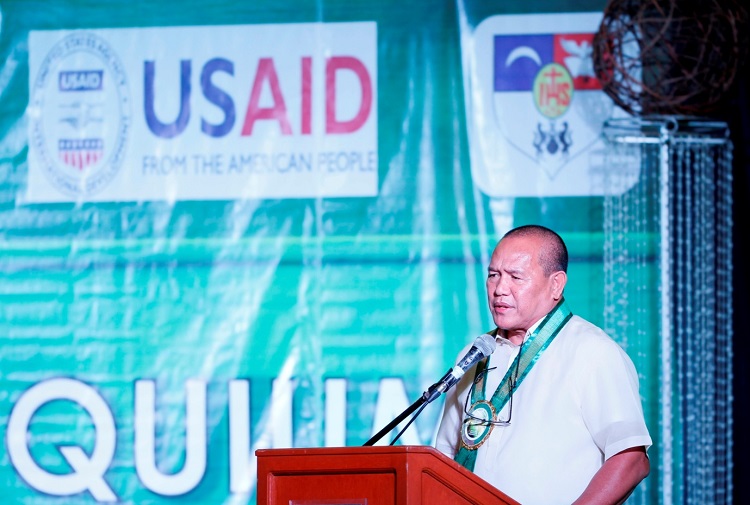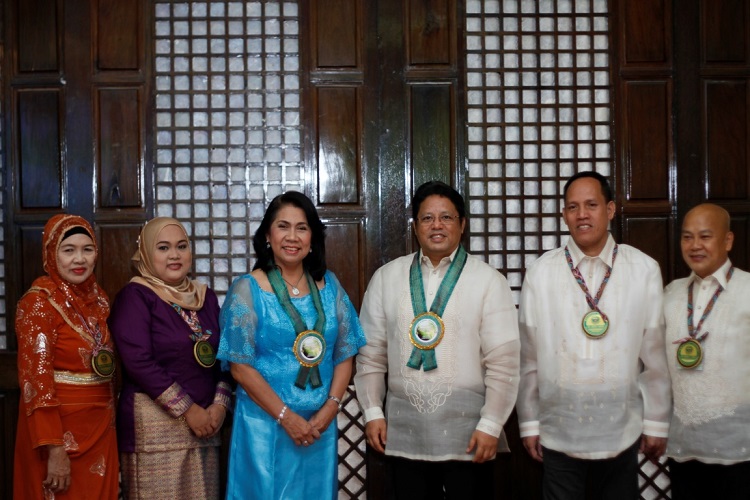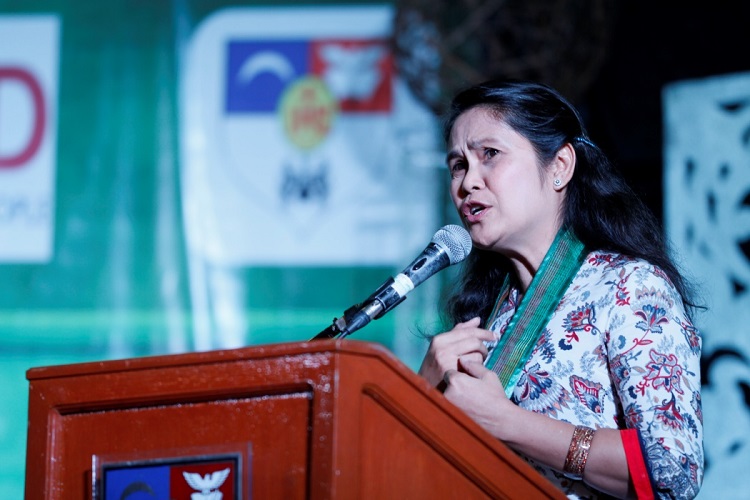
INSPIRING OTHER LEADERS. Cagayan de Oro City Mayor Oscar S Moreno delivers his message to the awardees at the GLI colloquium on June 10.
Text by Wilson J Hormeguera
Photos by Anthony Jacob C Karagdag
Four local chief executives and seven municipal health officers from the different local government units in Region 10 (Northern Mindanao) were recognized at the fourth colloquium and awarding ceremony of Xavier University’s Governance and Leadership Institute (GLI) on June 10 in Cagayan de Oro City.
“Gone are the days when LGUs say ‘we can do it on our own,’” said CDO Mayor Oscar S Moreno in his message to local health leaders. “Today’s governance highlights partnership and collaboration.”
The local chief executives who were recognized as Bridging Leaders for Health were Mayor Lorenzo V Mañigos of Kolambugan, Lanao del Norte; Mayor Fatima M Tomawis of Tangcal, Lanao del Norte; Mayor Omaradji C Pizarro of Kalilangan, Bukidnon; and Mayor Farhana R Palawan of Poona Piagapo, Lanao del Norte.
The activity formed part of GLI’s Municipal Leadership and Governance Program (MLGP), in partnership with the Department of Health Regional Office 10, Zuellig Family Foundation, and the United States Agency for International Development (USAID).
“It is a mistake to assume that health divide and other societal divides can be addressed by the government alone,” Moreno continued. “We need consortium and partnerships which can done through the Bridging Leadership process.”
Moreno, a bridging leader graduate himself under the Mindanao Bridging Leaders Program of the Asian Institute of Management, served at the guest speaker at the MLGP awarding ceremony. “Better health contributes to better liveability that leads to competitiveness.”
MLGP is a one-year, two-module program aimed at improving health outcomes through an empowering leadership and governance, enhanced local health systems, active community participation, and effective service delivery at the local level.
The said program is also geared toward creating an immediate impact on achieving related Millennium Development Goals (MDGs) such as the reduction of infant mortality rate (IMR) and improving maternal health in 609 identified priority municipalities nationwide that need to improve their local health systems.

BRIDGING LEADERS FOR HEALTH. From left to right: Mayor Fatima M Tomawis, Mayor Farhana R. Palawan, DOH's Dr Nimfa Torrizo and Dr Adriano Subaan, Mayor Lorenzo V Mañigos, and Mayor Omaradji C Pizarro.
Following the Bridging Leadership Framework (BLF), the mayors and municipal health officers went through a series of intensive discussions and workshops highlighting the health inequities in their respective localities.
DOH-10 regional director Dr Nimfa B Torrizo, in her message, challenged the local leaders to sustain the gains they have achieved during the program and assured the regional support, particularly during the forthcoming Duterte administration.
Considering that a certain health inequity is a systemic problem, the training emphasized the importance of multi-stakeholders’ co-ownership approach in addressing it. Thus, the bridging leader, together with the stakeholders, would lead the crafting of innovative solutions to health problems in their community.
“We are very happy to hear the stories of our local leaders, stories of transformation as Bridging Leaders, the lessons and insights behind the improved health scorecard,” said Engr Gail de la Rita, assistant to Xavier’s vice-president for social development, who gave the parting message to the program graduates.
“Xavier University will continue to be a significant and committed partner not only for health but for social development,” she added.
GLI, through MLGP, has already produced 39 local chief executives as Bridging Leaders who are transforming their health scorecards into better health outcomes in their respective communities. ∎

STORIES OF TRANSFORMATION. Assistant to Xavier's VP for social development, Engr Gail de la Rita, delivers her parting message to the local health leaders at the GLI colloquium.